LINCOLN, Neb. (AP) — Nebraska lawmakers failed to garner the 30 votes needed Tuesday to override Gov. Jim Pillen’s veto of a needle exchange bill that had garnered wide bipartisan support, leading to tense debate and a return to the partisan acrimony seen in last year’s session.
The bill received as many as 39 votes from the unique one-chamber Nebraska Legislature’s 49 members during three rounds of debate earlier this year. When only 27 voted to override the veto, supporters accused flip-flopping lawmakers of caring less about public policy than partisan politics.
“That speaks for itself on what’s really going on here,” Lincoln Sen. Danielle Conrad said.
Omaha Sen. John Fredrickson was more blunt in his criticism of those lawmakers who he said voted against the bill on Pillen’s orders.
“Have a spine,” he admonished.
Nebraska is among a handful of states that don’t offer at least some form of needle-exchange program. Such programs offer sterile hypodermic needles to intravenous drug users, often taking used needles in exchange to safely dispose of them. The idea behind the programs is to prevent the spread of communicable and sometimes deadly diseases like HIV and hepatitis C through the use of dirty needles. The programs are widely supported by health care officials, substance abuse treatment experts and law enforcement.
The Nebraska bill by Omaha Sen. Megan Hunt, an independent, passed last month with 30 votes — including 16 from Republicans in the officially nonpartisan Legislature. But after Pillen’s veto, seven Republicans flipped their vote to oppose the bill. Among them was Sen. Jana Hughes of Seward, who had lauded the bill on her Facebook page last week and criticized Pillen for vetoing it without an alternative proposal.
“Governor Pillen cited the fact in his veto statements that Nebraska had the lowest opioid overdose rate in the country,” Hughes said in that post, which remained on her page Tuesday. “While that is good news for Nebraska relative to other states, that is a bit like saying you are the last person to jump out of the plane without a parachute. Ignoring a problem does not make it go away.”
Asked to explain her vote against the bill Tuesday, Hughes refused to comment.
Fredrickson cautioned that the Legislature is ceding too much power to the executive branch. At least two of the lawmakers — Sens. Carolyn Bosn and Fred Meyer — who flipped their votes were appointed to their seats by Pillen.
Hunt and several Democratic lawmakers pointed to those flipped votes to accuse some lawmakers of caring less about public policy than partisan politics.
“Not one of those members got on the mic to share with Nebraskans, to share with their constituents, why they changed their minds,” Fredrickson said.
Bosn said after the vote that she changed her mind on the vote after receiving Pillen’s veto letter opposing it and denied that she had been pressured by Pillen’s office to vote against the override. She pointed to her support earlier this year of accepting $18 million in federal funding to help feed hungry children over the summer that Pillen had initially rejected as proof that she’s not beholden to the governor.
“I’m my own person,” she said.
In vetoing the bill last week, Pillen panned it as a move that would “encourage minors to abuse dangerous drugs” and that it would bring “the failed policies of drug-infested cities like San Francisco” to Nebraska.
No clinic or program administering a needle-sharing program is going to hand out syringes to young children, Hunt retorted.
“To imply otherwise is fear-mongering and undermines trust in Nebraska’s expert healthcare providers,” she said.
Copyright © 2024 The Associated Press. All rights reserved. This material may not be published, broadcast, written or redistributed.







